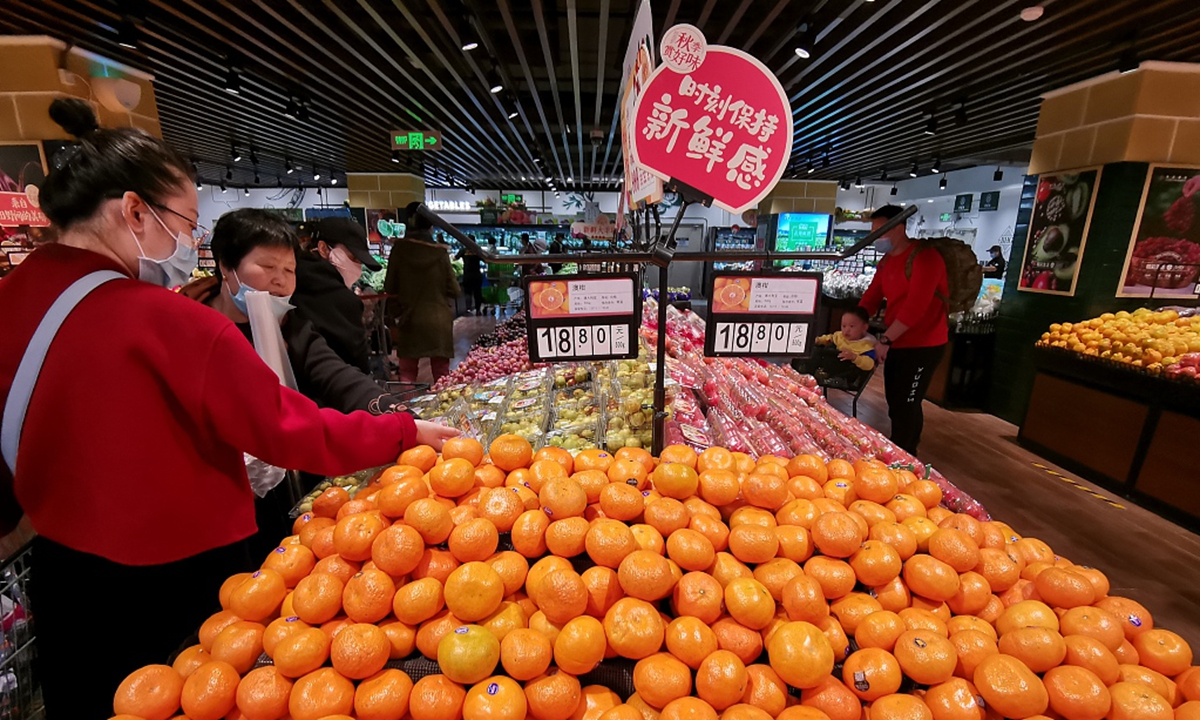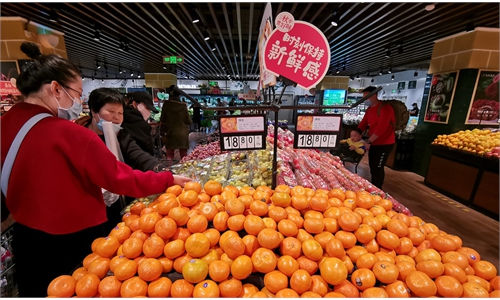China’s CPI, PPI remain stable in Feb, face pressure from rising global commodity prices

CPI Photo: VCG
China's consumer and producer price indexes edged up month-on-month in February as a result of global energy price fluctuations and higher commodity prices. However, both readings were stable when viewed on a yearly basis, with producer price growth slowing from a year earlier, according to official data released by the National Bureau of Statistics (NBS) on Wednesday.
The rise of commodity prices will have a short-term impact on China's factory output and infrastructure projects in the first quarter, but it won't have a major influence on China's economic fundamentals in the long run, experts said.
The producer price index (PPI) rose 8.8 percent in February from a year earlier, down 0.3 percentage points from January, NBS data showed on Wednesday.
On a month-on-month basis, the PPI rose 0.5 percent from January compared with a 0.2-percent decline in the previous month as a result of international price hikes for crude oil, non-ferrous metals and other commodities, said Dong Lijuan, a senior statistician from the NBS.
Amid Russia-Ukraine tensions, the sharp rise in international crude oil prices has driven up prices in domestic oil-related industries, with the cost of oil production rising 13.5 percent from January.
On a monthly basis, prices for fuel and power were 1.4 percent higher than in January, non-ferrous metal and wire prices rose 1.3 percent, and chemical and ferrous metal prices were up 0.4 percent and 0.3 percent.
The rise of commodity prices will put some pressure on Chinese manufacturing and infrastructure, but the price fluctuations will be short-lived, Cong Yi, a professor at the Tianjin University of Finance and Economics, told the Global Times on Wednesday.
"In the long run, the impact of the price hikes could be offset by tax cuts and supporting policies. China's energy self-sufficiency guarantee will protect the country from external shocks," Cong said.
Zhang Jianhua, head of the National Energy Administration, said on the sidelines of the two sessions that the key task for 2022 is to improve the stability and flexibility of energy supplies.
Efforts will be made to strengthen supplies of coal, have coal and coal-generated electricity play a leading role in the energy supply system, and intensify oil and gas exploration, Zhu said.
The National Development and Reform Commission, the top economic planner, has vowed to keep the country's daily coal output above 12 million tons this year.
NBS data showed that coal prices continued to fall in February, with prices for coal mining, washing and processing down 2.4 percent from the previous month.
It is expected that the PPI hike will stabilize through the year, Cong said.
"Oil prices have skyrocketed and it is expected that prices will gradually slow down in the future," Cong said, adding that future macro policies will focus on stimulating domestic demand, strengthening fiscal and tax policy support for enterprises and increasing infrastructure investment.
As overseas inflationary pressures have intensified, the PPI is expected to rise about 7.8 percent year-on-year in March, Wu Chaoming, chief economist at Chasing Securities, told the Global Times on Wednesday.
"It is expected that the PPI will be dragged down by stable domestic supplies, and international commodities will be a driving force for the PPI increase," Wu said.
Under the combined impact of the Spring Festival and fluctuations in international energy prices, the CPI rose slightly from the previous month but remained stable year-on-year, according to the NBS.
The CPI rose 0.9 percent year-on-year in February, and it was up 0.6 percent from the previous month.
The prices of fresh vegetables, aquatic products and fresh fruits gained 6 percent, 4.8 percent and 3 percent, respectively, from January, while prices of pork and eggs were down 4.6 percent and 3.7 percent month-on-month due to stable supply.
The CPI data showed that consumer prices in China are still stable and manufacturing activity is guaranteed, Cong said.
"Driven by policies to boost domestic demand, the CPI is expected to rise steadily throughout the year," Cong said.

